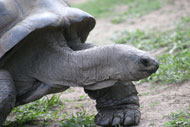Description:
The Aldabra tortoise is becoming more commonly available in the pet trade the world over, but it is still considered one of the more specialized tortoises. The Aldabra tortoise, because of its potential large size, requires a good deal of space and special consideration. Moving a tortoise that is more than 200 lbs is bad enough, but moving one that is more than 400 lbs can be problematic especially if the animal does not want to move or cannot. The Aldabra tortoise is only protected as far as trade so no special permits are required to keep and maintain these in captivity. Aldabra tortoises are adaptable and seem to be very cold tolerant, but they are still going to require supplemental heating to maintain a recommended temperature of 75 to 100 Fahrenheit. These tortoises, while being able to withstand low temperatures, do seem to prefer higher temperatures. The diet for the Aldabra tortoise in the wild consists mostly of weeds and grasses with occasional brows mixed in. In captivity they will eat almost anything. The suggested diet is a variety of dark leafy greens and grasses in addition a good mix of vegetables. It’s recommended to restrict the feeding of cabbages because of the propensity to develop thyroid problems among the giant tortoises due to a lack of dietary iodine. Providing as varied a diet as possible will usually alleviate any dietary deficiencies. Water should be provided at all times. Captive Aldabras consume great amounts of water if it is available. For more information, read our detailed aldabra tortoise care sheet. .
Habitat:
Groups of Aldabra tortoises inhabit mostly grasslands and areas of low shrubs but individuals will occupy almost any accessible habitat available.
Range:
Aldabra Atoll with introduced populations on Reunion, Mauritius and Seychelles Islands among other granitic islands of the Indian Ocean.
Scientific Name: Geochelone gigantea or Dipsochelys elephantina
Species Group: tortoise
Family: Testudinidae
Size: More than 500 lbs
Level: advanced
Weight: N/A
Dangerous: No



